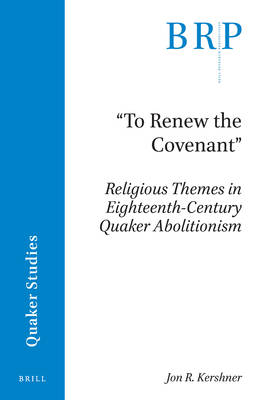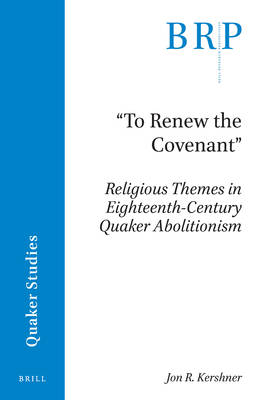
- Afhalen na 1 uur in een winkel met voorraad
- Gratis thuislevering in België vanaf € 30
- Ruim aanbod met 7 miljoen producten
- Afhalen na 1 uur in een winkel met voorraad
- Gratis thuislevering in België vanaf € 30
- Ruim aanbod met 7 miljoen producten
Zoeken
€ 123,95
+ 247 punten
Omschrijving
In "To Renew the Covenant" Religious Themes in Eighteenth-Century Quaker Abolitionism, Jon R. Kershner argues that Quakers adhered to a providential view of history, which motivated their desire to take a corporate position against slavery. Antislavery Quakers believed God's dealings with them, for good or ill, were contingent on their faithfulness. Their history of deliverance from persecution, the liberty of conscience they experienced in the British colonies, and the ethics of the Golden Rule formed a covenantal relationship with God that challenged notions of human bondage. Kershner traces the history of abolitionist theologies from George Fox and William Edmundson in the late seventeenth century to Paul Cuffe and Benjamin Banneker in the early nineteenth century. It covers the Germantown Protest, Benjamin Lay, John Woolman, Anthony Benezet, William Dillwyn, Warner Mifflin, and others who offered religious arguments against slavery. It also surveys recent developments in Quaker antislavery studies.
Specificaties
Betrokkenen
- Auteur(s):
- Uitgeverij:
Inhoud
- Aantal bladzijden:
- 124
- Taal:
- Engels
- Reeks:
Eigenschappen
- Productcode (EAN):
- 9789004372689
- Verschijningsdatum:
- 27/09/2018
- Uitvoering:
- Paperback
- Formaat:
- Trade paperback (VS)
- Afmetingen:
- 152 mm x 226 mm
- Gewicht:
- 317 g

Alleen bij Standaard Boekhandel
+ 247 punten op je klantenkaart van Standaard Boekhandel
Beoordelingen
We publiceren alleen reviews die voldoen aan de voorwaarden voor reviews. Bekijk onze voorwaarden voor reviews.











